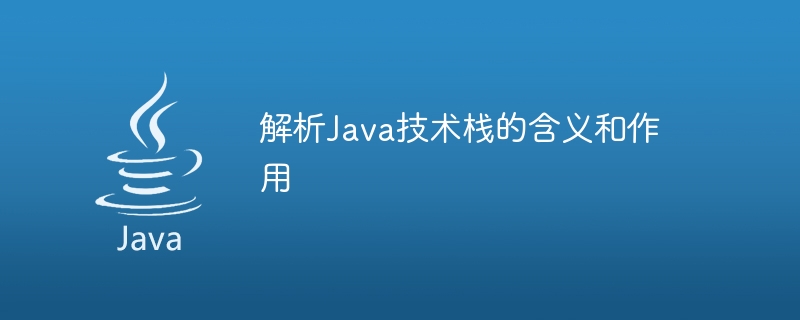Home >Java >javaTutorial >Explore the definition and functions of the Java technology stack
Explore the definition and functions of the Java technology stack
- WBOYWBOYWBOYWBOYWBOYWBOYWBOYWBOYWBOYWBOYWBOYWBOYWBOriginal
- 2024-01-11 16:46:19872browse

Analysis of the meaning and role of Java technology stack
Java technology stack refers to a technology stack composed of a series of Java-related technologies and frameworks. It includes Java's core language, Java Virtual Machine (JVM), Java standard library, development tools, and a large number of open source frameworks.
The role of the Java technology stack is to provide Java developers with rich and complete tools and frameworks to help them develop software more efficiently. The following will introduce each component of the Java technology stack and illustrate their functions through specific code examples.
- Java language: Java is an object-oriented programming language. It has a concise syntax and rich class libraries, allowing developers to quickly build reliable and secure applications.
public class HelloWorld {
public static void main(String[] args) {
System.out.println("Hello, World!");
}
}The above code is a classic Java program that outputs "Hello, World!". The characteristics of the Java language make it the preferred language widely used in enterprise software development.
- Java Virtual Machine (JVM): JVM is the running environment of Java. It is responsible for converting Java bytecode into machine code and executing programs. JVM is an important component of the Java technology stack. It provides cross-platform features so that Java programs can run on different operating systems.
- Java standard library: The Java standard library contains a large number of classes and interfaces, providing a variety of commonly used functions and data structures, such as collection classes, IO operations, network programming, etc. Developers can directly use the classes provided in the standard library to simplify development work.
import java.util.ArrayList;
import java.util.List;
public class ListExample {
public static void main(String[] args) {
List<String> list = new ArrayList<>();
list.add("Java");
list.add("Python");
list.add("C++");
System.out.println("List Size: " + list.size());
System.out.println("List Elements: " + list);
}
}The above code uses the List interface and ArrayList class in the Java standard library to implement a simple collection operation. By using the standard library, developers can quickly implement various functional requirements.
- Development tools: There are many development tools in the Java technology stack, such as IDEs (integrated development environments), build tools, and debugging tools, etc., which greatly improve the efficiency of Java developers. Common Java development tools include Eclipse, IntelliJ IDEA, Maven, etc.
- Open source frameworks: There are numerous open source frameworks in the Java technology stack, which provide a variety of excellent and mature solutions to help developers solve complex problems. For example, the Spring framework and its various modules (such as Spring MVC, Spring Boot) are widely used frameworks in Java development. It provides functions such as dependency injection and aspect-oriented programming, simplifying application development and maintenance.
import org.springframework.boot.SpringApplication;
import org.springframework.boot.autoconfigure.SpringBootApplication;
import org.springframework.web.bind.annotation.GetMapping;
import org.springframework.web.bind.annotation.RestController;
@SpringBootApplication
@RestController
public class HelloWorldApplication {
public static void main(String[] args) {
SpringApplication.run(HelloWorldApplication.class, args);
}
@GetMapping("/")
public String hello() {
return "Hello, World!";
}
}The above code creates a simple web application using the Spring Boot framework. By using the Spring framework, developers can quickly build a web application and implement various functions.
To sum up, the Java technology stack is a must-have technology stack for Java developers. It provides a wealth of tools and frameworks to help developers develop software more efficiently. By learning and applying knowledge about the Java technology stack, developers are better able to build reliable and performant applications.
The above is the detailed content of Explore the definition and functions of the Java technology stack. For more information, please follow other related articles on the PHP Chinese website!

